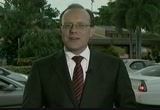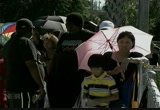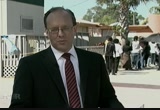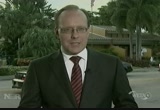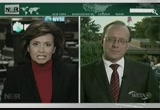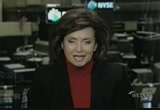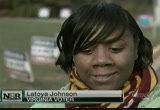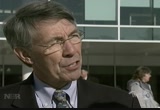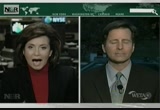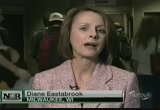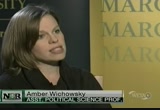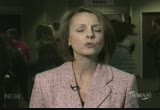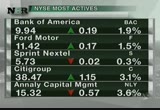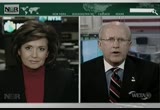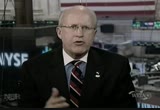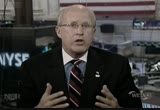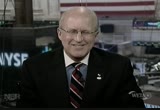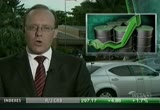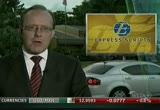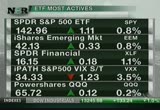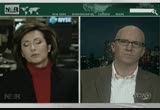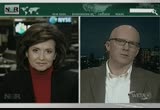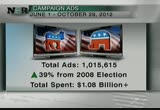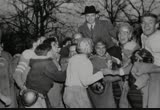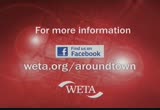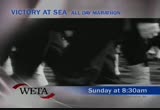tv Nightly Business Report PBS November 6, 2012 6:30pm-7:00pm EST
6:30 pm
>> tom: good evening. i'm tom hudson. with the presidential race down to the wire, i'm reporting tonight from a polling place in the swing state of florida, where it's the economy and healthcare bringing out voters. >> susie: i'm susie gharib. we'll also hear from voters in virginia, wisconsin and new jersey. but whoever wins the white house, he will need to solve one of the biggest problems facing the country, the fiscal cliff. we'll have all that and more tonight on nbr! election day is finally here, and americans across the country stood in long lines to vote for the next president of the united states. on wall street, stocks rallied ahead of the election results. there were no big headlines for investors to react to, but the presidential election is expected to lift a cloud of uncertainty that has been weighing on investors. by the cse, the dow surged 133 points, the nasdaq rose 12, and the s&p added 11 points.
6:31 pm
polls show that president obama and governor romney are in a tight race. ultimately, voters in a few key states will have the final say on who wins the white house. florida is one of those important battleground states. tom is in miami with more. tom. >> tom: susie, florida is the biggest swing state prize with the most electoral votes up for grabs. the economy, healthcare and immigration all are on display here with florida's diverse and growing population. voters in south florida today packed their umbrellas for the hot sun, and patience in some precincts. it's been a tight race in the sunshine state. compared to four years ago, it was a harder time deciding whom to vote for, for her. >> this time it came to the nitty gritty, they were fighting about real things, jobs, health care and i think they both have very good points. >> reporter: for her the decision came down to health care and medical insurance coverage, supporting president
6:32 pm
obama's effort to reform the industry. but natalie felt differently. >> there's a lot of changes in health care that really are not going to benefit our seniors, and especially with the influx of alzheimer's and more people being predisposed to it at this time. it's scary. so i really want to see, i want to see the government take a stand to help out, especially with the elderly, it's really difficult. >> tom: it's just before 2 p.m. here in north miami beach, in a predominantly african-american precinct. the wait in line a little under an hour here today, the shortest it's been in the past several hours. florida was ground zero during the 2000 disputed presidential race. it has not been without controversy this election cycle. the g.o.p. led state legislature and republican governor moved to limit early voting, cut the number of days and hours to about half of what it was four years ago. that led to long wait lines leading up to election day and lots of confusion. like the national economy, florida's economy has been slowly improving. foreclosure rates have come down, but still remain high,
6:33 pm
and florida's unemployment rate at 8.7% continues to be higher than the national rate. >> i voted again for obama because he does not have... things can change in a day. president bush left us in a very very bad position, so things cannot change in a day. so that's why i'm giving president obama another chance. >> we do have a business and it does seem to have picked up a little bit. not great, but a little bit. >> tom: coming into election day, governor romney has been leading president obama in the latest miami herald statewide florida polls by about six points. that's because of growing support for governor romney in central florida and northern florida, areas with housing markets still struggling and with unemployment rates generally above the national average. >> susie: that's really fascinating, tom, sort of like the tale of two cities. what about south florida, what about voters in the rest of florida? >> tom: south florida is an interesting case, the housing bust certainly happened here
6:34 pm
in miami in south florida. but thanks to foreign buyers coming back in, the housing market has stablized faster than in the rest of florida, and prices are actually on the rise again. that has helped bring up the unemployment rate, while still in south florida above the national average, it has been dropping faster than other places in florida. the interstate 4 corridor which runs route through the center of florida through orlando is really key for the election both for turnout of new immigrants for the democrats as well as democrats switching over and voting for the republican ticket for governor romney. >> susan: speaking of immigrants, we've been talking a lot about economic issues, the unemployment rate, housing. how important was immigration for the florida voters? >> extremely important. the only conversation both had on immigration was based here in south florida on spanish tv. you've got a second and third generation families of immigrant here in south florida, newer immigrants are in central florida. they come from different locations, but still latin america, but they have different ideas about how to
6:35 pm
deal with the imgriggs issue. governor romney and the self deportation situation has not necessarily found a significant audience even in south florida. nonetheless as the latest poll shows, he has been gaining some strength with voters in north and central florida. >> susan: thanks, tom. we'll catch up with you later in the program. virginia is another crucial state, and will be one of the first swing states to tally election results tonight. polls close at 7:00 p.m. eastern time, and the race looks close, a mirror of the national race. darren gersh joins us from virginia. darren. >> reporter: susie, we're here in woodbridge, virginia, which is considered a swing area in a key swing state. and it's a state that also surprised the candidates this election. after the voting here is over, you'll be hearing a lot more about the fiscal cliff, those automatic spending cuts and tax increases scheduled to take effect on january 1.
6:36 pm
you'd think the fiscal cliff would be a huge issue here. virginia depends heavily on defense spending and is facing massive cuts if congress doesn't act. but sequestration, the official word for the fiscal cliff cuts, hasn't been a campaign issue. >> they tried to play sequestration and blame it on each other, and i don't think it had any traction whatsoever. most people don't know what it is and they blame both parties for it. >> reporter: voters here are more concerned about everyday economics. >> mainly, i want change in the economy, like better prices on gas and food. i want to make sure my job is secure. >> i'm looking at my grandkids as far as college and what the future is going to hold for employment for them and even if they can. >> followings stocks. when you study them and you realize that the economy is doing better than people admit. reports i read give the honest take versus the political take.
6:37 pm
what i see is an economy that is on a slight trend, and i want to see the trend continue. therefore, i'm going to do something to make sure my vote does not disrupt forward momentum. is ieporter: the defi .big issue for virginians. the tea party is strong here, and even virginia democrats tend to be fiscal conservatives. but voters here are also keenly aware of their state's dependence on defense spending. >> counteracting that is the sense that we just can't keep spending money we don't have, and i think there is a strong group of voters who worry about the deficit and about when interest rates go up and can we afford this and what does it do to our grandkids. and i think that resonates, too. >> reporter: virginia is tracking national polls, so if there is going to be a surprise tonight, you might see it here first. >> susie: we hear a lot of from the voters talking about economic issues, and i know you've been talking to people all day long. give us a little more color about what they were telling
6:38 pm
you. >> reporter: well, i think people here have a pretty realistic understanding that a president can do only so much to improve their economic condition and their economic lives. but that said, they are very concerned about jobs. also there's a lot of concern about prices, inflation, even though the fed doesn't see it, people here are concerned about it. i'm not sure what the next president is going to do about that, but it these kind of pocketbook issues that people are most concerned about. >> susie: you also talked about the fiscal cliff and virginia is one of this is states with a very competitive senate race. so how important is the senate in making policy changes with issues like the fiscal cliff? >> reporter: it's going to be critical. here in virginia it looks like the democrat tim kaine has a slight end over george allen, and nationwide it could be that democrats are going to seize their majority in the senate remain unchanged. i think if that happens, you're going to see democrats go into the negotiations on the fiscal cliff which begin next week works the feeling
6:39 pm
that they have a strong hand and that they should play for very tough negotiations. >> susie: this is an issue for wall street as much as the rest of america and we'll be watching it closely. thanks a lot, darren, car len gersh in woodbridge, virginia. we turn now to wisconsin. no republican presidential candidate has won the state since ronald reagan. diane eastabrook has more on this. she's standing by in milwaukee. diane. >> reporter: susie, the latest polls show president obama winning by a couple of percentage points. but it could be a squeaker. in this working class neighborhood on milwaukee's northwest side, voters poured into a school administration building to cast ballots throughout the day. >> we had lines at 7:00. before the polls even opened, there were probably 20 to 30 people in line. >> reporter: while wisconsin native paul ryan tops the republican ticket with mitt romney, the economy was more important to the voters we spoke
6:40 pm
to than badger state pride. >> right now, i'm unemployed, so whoever is going to make it better, i'm all for that. >> reporter: in september, the unemployment rate in wisconsin was 7.3%; when president obama was elected in 2008, the state's unemployment rate was 5.9%. while the state has added only 4,100 jobs from january through september of this year, the improving national employment numbers appear to be working in the president's favor. >> in the beginning of the year, only one in five voters said that the economy has gotten better in the past year. in the most recent poll, that number has increased to one in three, saying the outlook is looking better for the state. >> reporter: and that appears to be the perception that many voters here had. >> i think the economy is starting to get better as we go along here. >> i think jobs are now opening, you know, a lot of jobs are offering help now, and before
6:41 pm
they never did. >> reporter: and voter turnout throughout wisconsin has been very heavy today, in fact here in milwaukee in the last presidential election about 80% of the registered voters here in milwaukee cast ballots. >> susie: so, you reported about the economy being an important issue for the voters that you've talked to. tell us a little bit more about what they were telling you. >> reporter: if you look at the job numbers there have been some months in summer where they were up, 6 or 7,000 jobs and then down a few thousand jobs. so that's a real concern for a lot of the people here. those are just some of the issues that really have been on the minds of a lot of the voters that we talked to today. >> susie: you know, one other interesting thing about the state of wisconsin is that governor romney barely campaigned in the state, pretty much relying on paul ryan to do the heavy lifting. could that work against governor romney? >> reporter: you know, it's possible. governor romney was here on friday and he really hasn't been here in the last couple
6:42 pm
of months. he's been kind of a no show, he's had other politicians coming and campaigning here in wisconsin. particularly congressman ryan. congressman ryan is known there because that's the district he serves, but hasn't been that well-known around the state. so it's hard to say at this point whether that will have any kind of impact on the voters turning out today. >> susie: we'll find out soon enough. thanks a lot, diane. diane estabrook from the polls in milwaukee, wisconsin. i >> susie: as we've been reporting, voters are already
6:43 pm
worried about the next big issue right after the election, the so-called "fiscal cliff". it's a series of automatic spending cuts and tax increases that take effect on january 1 unless congress can agree on alternatives. our next guest has been working with policymakers on finding solutions to the nation's fiscal issues. he's david walker, c.e.o. of comeback america. so, david, what's the first thing the next president has to do to solve the fiscal cliff problem? >> well, first, who ever wins tonight should call the congress to come back to washington d.c. and work full-time, that means at least monday through friday, taking off only national holidays, until they reach a deal in the fiscal cliff. in other words, no deal, no break. and while we have to avoid the fiscal cliff, we need to achieve a grand bargain next year so we can avoid the fiscal abyss. so the president should also congress on congress to work monday through friday every
6:44 pm
week, except for federal holidays, next year, until we have a grand bargain. it time these people started working full-time and generating results. >> susie: well, that sounds like a good way to tackle this huge problem. but what are the chances that congressional lawmakers can agree at the end of the day on some kind of solution? >> well, susie, i think we have to be realist iic, you're not going to get a so-called grand bargain in a lame duck session. there's a reason it's called lame duck. but i think what we can do is end up agreeing on not extending, for example, the 2% payroll tax cut, that saves $100 billion. potentially having some defense and other spending cut much less than scheduled to happen under the sequestration, and basically delay the big ticket items until nine month or so into 2013 to facilitate achieving that grand bargain, dealing with social insurance perhaps, comprehensive tax reform, defense and other spending reductions. >> susie: these are all very
6:45 pm
controversial topics. let's say that lawmakers and the president don't come to any kind of a deal. and we go over the cliff, so to speak. some economists are saying that means that the u.s. economy goes into recession. >> well, i think we would go into recession, we'd exacerbate our unemployment, underemployment problems, unless it was reversed very quickly. but what a lot of people haven't focused on is, you know, it takes 60 votes to get something through the senate unless you use something called budget reconciliation, which only requires a majority vote. under current rules you can only use that if you're making the deficit less, not more. so if you try to reverse a tax increase or you try to reverse a spending cut, you're not going to be able to do that unless you have 60 votes. and that's going to be tough. >> susie: all right, we have american voters in the polls now who are going to decide who's the next president. but from your point of view, which candidate has the best plans to solve this fiscal
6:46 pm
crisis, if at all? we have less than a minute. >> in all candor, susie, neither one of them have lay out a comprehensive and credible plan to solve this problem. i will, however, say that i think that governor romney would have a lot more influence over the republicans in the house than president obama would, and under the constitution all tax bills have to start in the house. if you can't pass the house, you're going nowhere fast. >> susie: well, we'll find out soon enough how this plays out. thank you very much for coming on the program, david walker, c.e.o. of comback america.
6:47 pm
>> tom: stocks climbed as voters went to the polls for a small election day rally on wall street. the s&p 500 started in the green from the opening bell with the gains picking up sam around 11:30 eastern time after the european markets closed. the index finished higher by eight tenths of 1%. unading volume on th settled at 670 million shares, while nasdaq weighed in under 1.8 billion. the energy sector was the strongest of the major groups, rising 1.6%, followed by financials and industrials. energy stocks were strong on the backs of an oil price rally. crude oil jumped more than $3 per barrel, rising to its highest price in two weeks. among the oil giants, chevron and exxon mobil were each higher by more than 1%. aol is at a new high tonight. the company once known for its internet service now relies on internet advertising. quarterly earnings were a nickel above estimates, while revenue was flat compared to a year ago. revenue from aol u.s. display advertising, its core business
6:48 pm
was down, but its overseas and internet search ad sales registered gains. shares shot up more than 20% on a big jump in volume. while its sscription business continued falling, the pace of the drop slowed down. another otsinnlcompany, real estate web site operator zillow, fell hard after its disappointing outlook last night. shares fell more than 18% down to their lowest price since january. express scripts took a hit, thanks to a disappointing forecast for next year. the company is a pharmacy benefits manager, and it blames its downbeat outlook on losing customers and low utilization. shares fell 12.3%. volume exploded more than ten- fold. the stock is at its lowest price since july. today's fall has erased some of the gains this year shareholders have enjoyed since its summertime buyout of medco health solutions. the company's business has been hurt by walgreen's leaving the express scripts network over a contract fight, even though that disagreement hre binn eesolved and the two are doing business together again.
6:49 pm
meantime, rival cvs caremark said it is benefiting from that dispute between express scripts and walgreen's with more retail pharmacy customers. cvs expects to keep the majority of walgreen customers it grabbed earlier in the year. shares rose a one half of 1%. cvs quarterly earnings were a penny more than estimates. cvs raised its outlook for pharmacy sales thanks to flu prescriptions and selling more generic drugs, which come with higher margins. the company said hurricane sandy will hit fourth quarter earnings by about a penny p share.n four of the t vereos mactively traded e.t.f.s were higher, but the ipath s&p 500 exchangeos traded note was the weakest down 5%. and that's tonight's "market focus."ow
6:50 pm
>> susie: in the storm-ravaged states of new york and new jersey, officials made sure everyone today would be able to vote. authorities let residents uprooted by hurricane sandy vote at any polling center in their states. in new jersey, some citizens were even allowed to cast ballots by email. as suzanne pratt reports, sandy's chaos didn't stop voters from getting to the polls. >> reporter: parsippany, new jersey, was hit hard by hurricane sandy. many homes still have no power, and many gas stations are still dry. nevertheless, residents made it their business to vote today, even though their polling site had to be moved at the last minute to a new location.
6:51 pm
>> reporter: in manhattan, only a handful of voting centers had to be changed because of the storm's aftermath. this site downtown is also accommodating voters from another location, and some residents found the change somewhat confusing. >> it's pretty hectic, being as though we're sharing ed from other schools due to the storm, and other schools being closed due to the storm. >> but without our cell phone, we'd be lost. >> reporter: and at least some voters were able to keep their sense of humor...
6:52 pm
>> this is whwere i vote. >> reporter: suzanne pratt, nbr, parsippany, new jersey. >> susie: hurricane sandy disrupted the election process in an election that was already getting complicated. from mail-in ballots to high- tech voting machines, there are fresh questions about the accuracy of the election system. joining us now, a man who has been studying all aspects of the election process since the controversial 2000 presidential election-- charles stewart, co-director of the voting technology project and professor at m.i.t. you know, charles, there's already talk about the accuracy of the election results, possible recounts, sloppy signatures in the may-in votes. how serious is this really? >> well, from what i can tell in this election, the concerns that are being raised are not
6:53 pm
any more serious than in previous elections and in many ways ironically enough looking like a relatively quiet day. >> susie: so will we know who the president is tonight or early tomorrow morning? or will we be talking about a recount? >> well, at this moment i'm expecting for us to go to bed late tonight at least, still probably knowing who is going to be the president. although there are issues in ohio, even under the best of circumstances it mate be a few days until we're quite certain what's going on there. >> susie: and how about the people who are voting in sort of ad hoc situations because of hurricane sandy, whether they are e-mailing their votes in or faxing their votes in, will those votes be counted or will they be accepted or rejected? >> well, let hope they're accepted. the new jersey situation especially where they're experimenting with e-mail and faxes, those procedures are
6:54 pm
quite complicated. so my concern is that people may decide either not to jump over all the hurdles or make a mistake in the middle and in the en not get their vote counted, after puting in a lot of effort at it. >> susie: you know what's amazing in all of this is that in this era of the 21st century in this era of text messaging and e-mail and facebook that we're still relying on somewhat old fashioned voting technology. when do you think that will change? >> well, i think it's going to take quite a while to change. the scientists who study this are pretty much of a consensus that security concerns in voting really are much graver and more difficult than even e commerce. so don't expect to be voting by internet any time soon. maybe not even in our generation. >> susie: well, all right, we'll leave it there. thank you very much, charles. charles stew ward, co-director of the voting technology project.
6:55 pm
>> susie: tomorrow on nbr, from the results to the message from voters, and wall street's reaction. we'll have the latest on election 2012. the presidential race is in a dead heat, but one thing is certain, the election big winner this year-- the advertising industry. the two presidential campaigns, the political parties and their supporters have spent over $1 billion on advertising, funding more than one million ads. and if you think you've been bombarded with commercials, you're right. this year, there was a 40% jump in the number of ads versus the last presidential campaign. team obama spent nearly half a billion dollars on ads; for romney, $624 million. that's "nightly business report" for tuesday, november 6, election day. have a great evening. we'll see you online at nbr.com, and back here tomorrow night. captioning sponsored by wpbt
294 Views
IN COLLECTIONS
WETA (PBS) Television Archive
Television Archive  Television Archive News Search Service
Television Archive News Search Service 
Uploaded by TV Archive on

 Live Music Archive
Live Music Archive Librivox Free Audio
Librivox Free Audio Metropolitan Museum
Metropolitan Museum Cleveland Museum of Art
Cleveland Museum of Art Internet Arcade
Internet Arcade Console Living Room
Console Living Room Open Library
Open Library American Libraries
American Libraries TV News
TV News Understanding 9/11
Understanding 9/11